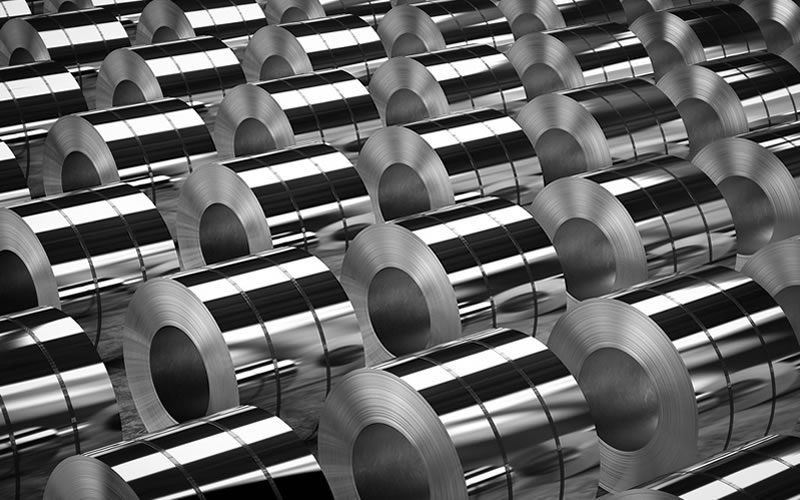Our Products
CARBON STEELS
CARBON STEELS They are iron-carbon alloys that contain small amounts of elements from steel production methods such as manganese, silicon, sulfur and phosphorus. They are also known as manufacturing steels because their usage areas are the construction and manufacturing sector. All the properties of carbon steels are directly related to the structures they have, depending on the amount of carbon they contain. With increasing carbon content, hardness, yield and tensile strength of steels increase, while ductility (% elongation and % section shrinkage) and impact strength properties decrease. The increase in the amount of carbon (depending on these properties) plays a lowering role in the plastic forming ability of steels. On the other hand, as a very important and effective element in martensitic transformation, it makes it possible to harden steels by the mechanism we call quenching. The increase in carbon content has an adverse effect on the water uptake and weldability of the steel. Low carbon steels can be classified into three groups according to their carbon content. Low Carbon Steels: Steels containing up to 0.20% carbon can be included in this group. Considering their mechanical properties, they are also known as mild steels. Low carbon steels comprise the largest amount of world steel production. In particular, flat products, steel bars and profiles used in the construction industry and basic structures are in the class of low carbon steels. Low carbon steels cannot be sufficiently massively hardened by heat treatment due to their low carbon content. However, cementation, nitration etc. Surface hardening processes can be hardened surfaces. Medium Carbon Steels: Steels in this group are steels containing carbon between 0.20-0.60%. They have moderate mechanical properties depending on the carbon content. The most important feature of the steels in this group is that they can be sufficiently hardened by heat treatment. In this respect, the usage areas of medium carbon steels are special. They are especially preferred by the machinery manufacturing industry. Their machinability and shaping capabilities are lower than low carbon steels. The welding capabilities of the steels in this group are also lower than those of low carbon steels. Because the uncontrolled thermal effects that occur during welding cause the structural change of the steel to be uncontrolled. As a result, it may cause defects in the materials. For this reason, special care should be taken in welding processes of medium carbon steels, especially those containing alloying elements. High Carbon Steels: Steels containing more than 0,60% carbon. Normally, they are steels with high strength and low ductility. They gain high hardness by being hardened by heat treatment. In this respect, they are wear-resistant and have cutting properties. Their machinability and shaping capabilities are lower than those of low and medium carbon steels. Welding capabilities are also low and welds can be made with more special techniques. Steels in this group are mostly used in tool production. Although the limit of the amount of carbon in the composition of high carbon steels can be up to 2% in accordance with the iron-carbon balance diagram, this value is limited to 1.2-1.4% in practice. Especially high carbon steels can absorb water more easily than low and medium carbon steels and the hardness of the martensitic structure obtained is also higher. KARBONLU ÇELİKLERİN KULLANIM ALANLARI VE ÖZELLİKLERİ Kalite Kullanım Alanları ve Özelikleri Düşük Karbonlu Çelikler Cıvata, somun, ıslah edilebilir makine parçaları imalatı, yapı ve inşaat sektöründe görev alarak kullanılabilir. Yüzey sertleştirme işlemleriyle sertleştirilebilirler. Orta Karbonlu Çelikler Makine, cıvata, somun, dingil, gemi şaftı, uskur mili, dişli çark, transmisyon mili, frezeli mil, yük kancas›, manivela kolu, ray, kazma, kürek gibi araç gereçlerin yapımında kullanılır. Isıl işlem ile sertleştirilmeye uygundur. Yüksek Karbonlu Çelikler Mil, şaft, cıvata, somun, spiral ve yaprak yaylar, makaslar, kesici basit takımlar, zımba, kepçe dişlisi, greyder bıçağı, yüksek mukavemetli makine parçaları, eğe, keser, ağaç testeresi gibi araç gereçlerin yapımında kullanılır. Isıl işlem ile sertleştirilmeye uygundur. KARBONLU ÇELİKLER MKE NO DIN C Si Mn P S Ç 1020 C 15 0.15-0.24 0.10-0.30 0.30-0.60 0.040 en çok 0.050 en çok Ç 1030 C 22 0.25-0.34 0.10-0.30 0.60-0.90 0.040 en çok 0.050 en çok Ç 1040 C 35 0.35-0.44 0.10-0.30 0.60-0.90 0.040 en çok 0.050 en çok Ç 1040 CK 35 0.32-0.38 0.15-0.35 0.50-0.70 0.035 en çok 0.035 en çok Ç 1050 C 45 0.45-0.54 0.10-0.30 0.60-0.90 0.040 en çok 0.050 en çok Ç 1060 C 60 0.55-0.64 0.10-0.30 0.60-0.90 0.040 en çok 0.050 en çok Ç 1060 CK 60 0.57-0.63 0.15-0.35 0.60-0.90 0.035 en çok 0.035 en çok
